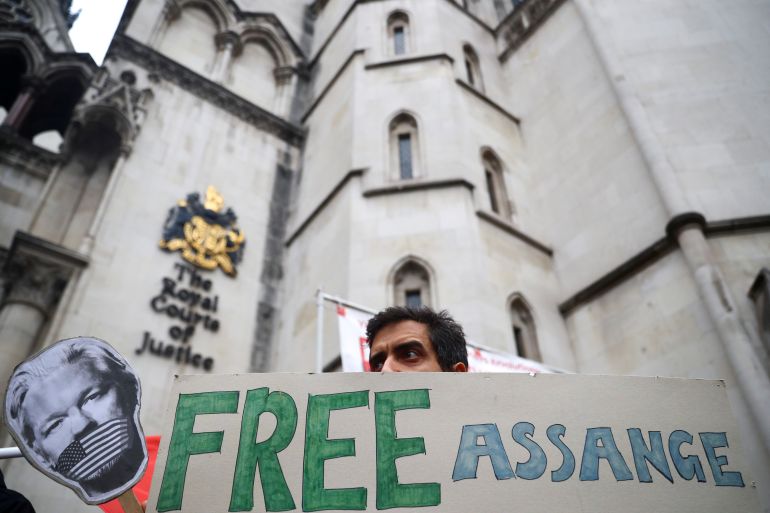Australian PM rejects calls to intervene in Julian Assange case
UK government ordered extradition of WikiLeaks founder to the US on spying charges, risking up 175 years in prison.

Anthony Albanese, the newly elected prime minister of Australia, has rejected calls for him to publicly demand the United States drop its prosecution of WikiLeaks founder and Australian citizen Julian Assange.
Bob Carr, who was foreign minister when Albanese’s centre-left Labor Party was last in power in 2012 and 2013, wrote in an opinion piece in The Sydney Morning Herald on Monday that an Australian request to drop Assange’s prosecution was a “small change” in Australia’s defence alliance with the US.
Keep reading
list of 3 itemsUK court order moves Julian Assange closer to US extradition
Revisiting the trial of Julian Assange
Speaking to reporters, Albanese declined to say whether he had spoken to President Joe Biden about the case after the British government last week ordered his extradition to the US on spying charges, risking up to 175 years in jail.
“There are some people who think that if you put things in capital letters on Twitter and put an exclamation mark, that somehow makes it more important. It doesn’t,” said Albanese, who came to power in elections a month ago.
“I intend to lead a government that engages diplomatically and appropriately with our partners,” Albanese added.
Assange’s supporters and lawyers say his actions were protected by the US Constitution, and his lawyers have pledged to appeal the United Kingdom’s decision.
The legal battle began in 2010 after WikiLeaks published more than 500,000 classified US documents about the wars in Iraq and Afghanistan.
Assange had lived in the Ecuadorian embassy since 2012 until he was moved to a top-security jail in southeast London in 2019, where he spent three years for jumping bail in a previous case accusing him of sexual assault in Sweden.
That case was dropped but he was not released on grounds he was a flight risk in the US extradition case.
In his op-ed, Carr argued that Assange’s prosecution stood in sharp contrast to the US pardoning former military intelligence officer Chelsea Manning, who had leaked the secret files to WikiLeaks.
Carr said this was Albanese’s “most potent argument” to advocate for Assange’s release.
“If Albanese asks, my guess is America will agree,” Carr wrote.
Meanwhile, Assange’s wife Stella Assange believes there has been a noticeable “shift” in the Australian government’s handling of her husband’s case since Albanese’s election win.
Speaking to the Australian Broadcasting Corporation, she said Australia “can and should be speaking to its closest ally to bring this matter to a close”, calling the case an “aberration” that criminalises journalism.
Stella said her husband was being prosecuted for exposing war crimes and abuses of power.
“The only goal here is to free Julian because this has been going on since 2010. He’s been in prison for over three years and the case against him is a travesty,” she said.
Also, she expressed worries about what she described as his deteriorating health situation.
“It’s a nasty environment and it would deteriorate anyone’s health but he was already in a bad health situation when he entered the prison,” she said, adding that her husband had suffered a “ministroke” in October last year.
“So his health was in decline and we’re extremely worried that he will at any moment have a catastrophic health episode inside Belmarsh prison without the ability to get emergency treatment – because that’s the nature of prisons, basically.”